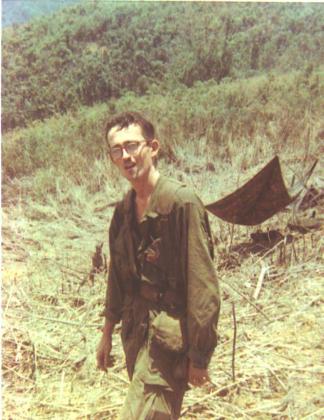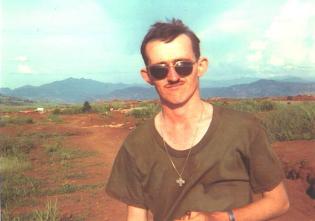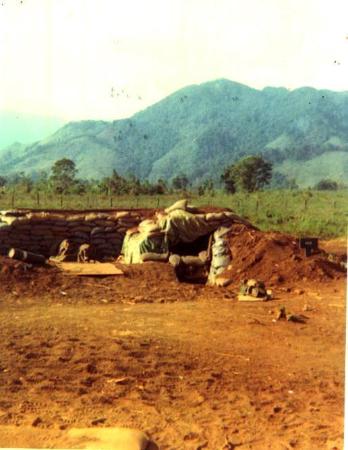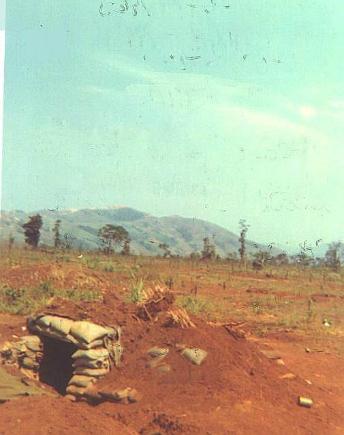This article is adapted from Bob Adams' play Place of Angels. It is slated for publication in
Vietnam magazine in 2006.
Healing Wounds
by Bob Adams (2nd Batt. 1st Mar. 68-69)
with Will Kern
God and all of North Vietnam could see us.
We were outside Khe Sanh on Operation
Scotland II and had stopped at midday to take
a bit of rest and to eat. We had set up on the
side of a hill, far too exposed for safety. We
were all very tired from humping the hills on
this operation. 2nd Battalion, 1st Marines.
You’d think we’d be smarter. It was a careless
thing to do.
As we got up to move, the NVA started walking
mortars in on us. The chaos is unimaginable.
The THUMP! of the mortars being dropped in
the tubes, and ejected. Then the explosions:
BOOM!… BOOM!… BOOM!… BOOM!… BOOM!
BOOM! BOOM! Sand and shrapnel
flying everywhere. Men separating and diving
in all directions. Shrieks of “INCOMING! ...
INCOMING!” The ground shaking from the
detonations. Men lying still and eating the
earth to stay low. I found what seemed like a
small indentation in the ground and got down.
Then I heard the screaming. My best friend,
LCpl Jim Tucker, had been hit.
The date was May 11, 1968. I was a corpsman
in the US Navy but had been assigned to the
Marines. I joined the Navy in 1966 because I
thought it was a way of getting out of combat. I
was absolutely terrified of going to war.
In boot camp, I was given a choice of jobs and I
chose hospital corpsman because I had an
uncle who was a corpsman in World War II. He
served aboard an aircraft carrier, came home
and became a successful optometrist.
I saw something like that happening for me.
I picked corpsman without asking anyone who
might know what the job would involve. The
night I got back to the barracks and told my
CC, SMC Edward Chambliss, what I did he flew
into a rage. Imagine my surprise when I found
out that the thing I was most afraid of in the
world was exactly the thing I was going to have
to do. I was not going to be aboard ship. I was
going to be in a Marine combat unit. He was
so mad he told me he wasn’t going to wait for
the Cong to kill me. He was going to do it
himself.
I didn’t really belong in the military. I’m blind in
my left eye from birth, 20/400 and not
correctable. When I went for the eye test on
my induction physical, I couldn’t read the
chart. But I’ve been taking eye tests since I
was three and I know that the big letter is an
“E,” so I said to the doctor, “I think I can make
out an ‘E.’ ”
Slam, bang, bam, I’m a member of the United
States Naval Service. That was the state of
the military in 1966. They needed bodies so
badly they were taking one-eyed goofs from
Chicago who happened to weigh 100 pounds.
Even the recruiter said he never thought I
would make it.
Two years later, in Con Thien, I started my
tour. And got the word. As far as these
Marines were concerned there were two kinds
of corpsmen. One was like Doc Waller, a.k.a.
The Goat. He traveled with the command
group and didn’t like to live like a troopie. He
played it by the book, was a stickler for
protocol. If he found out you didn’t take your
malaria pill he might just as soon write you up
as talk to you about it. And he INSISTED that,
in any casualty situation, the wounded be
brought back to him. A BOOK thing. The
RIGHT thing.
Then there was Kid Squid*. (All of us Navy
were referred to as Squid. But if you were
liked and admired, they’d add a nickname).
Kid Squid lived with a squad, stood radio watch
like any other troopie, helped out in any way
he was needed. And Kid Squid’s deal was,
“Wherever you are – if you’re hurt, don’t worry,
I’m coming for you.”
What kind of corpsman was I going to be?
They would be watching. So I got it early. I
understood. Whatever the book said,
whatever technique I had been taught at Field
Medical School was out the window. No one
expected any less of you than that you join the
war with them, that you did for them what they
would do for you. You stood radio watch. You
carried your equipment and, if need be, theirs.
If it came to it, you put the medical equipment
down and picked up a weapon and fought for
them as well. And you NEVER waited in a hole
for some wounded Marine to be dragged back
to you. You came for them as they would for
you. And that was the word.
I was made to understand quickly that out
there, to those young Marines, the book meant
nothing. They had respect, admiration, and
affection for the Kid. He was one of them. And
he came for them. NO MATTER WHAT! The
Goat they didn’t have much use for. He knew
it, I think. And they knew it.
My best friend in squad was Tucker. A big
strong kid from New England, a great spirit.
We became good buddies, kind of a Mutt and
Jeff team. We looked out for each other, often
traveling close to each other on patrol and
sharing C ration meals together. By Khe
Sanh, I had been eating out of C ration cans
for three months. I could barely eat any of it
anymore. Tuck would make sure I got
whatever of his I could eat, as he could eat just
about anything.
Tucker and a couple of other guys committed
an act of larceny on my behalf. A shipment of
SP packs came into the CP, and Corporal Mick
Zullo, a Californian, went to ask the supply
clerk, Lt. Ken Daniels, for some cigars that
were in the packs. He did this because I was
flat out, and didn’t smoke cigarettes like
everybody else. Daniels told him to fuck off.
Zullo came back to our bunker and told
Tucker, and he was pissed. He wanted to go
back down to CP to argue the LT out of the
cigars, but he got talked out of it. Later,
Tucker, Zullo, and Pfc Charles Perry went to
an abandoned Army supply dump to scavenge
for food, or anything else we might need.
While there they found three SP packs that
had been left behind. Tucker said, “Fuck, let’s
get the cigars out of the SP packs for the
Doc.” The three of them carried the SP packs
back to our bunker, split them open, and gave
me the cigars, thirty in all. We took whatever
else we wanted and the four of us spend the
night burying the remaining supplies. They
could have been reprimanded for the theft, but
they were willing to take the risk. For me.
I had gotten so close to my squad by the time
we got to Khe Sanh. It was like we knew what
everyone was thinking and feeling. I felt a little
foolish with how much I had grown to love
these guys.
And there they were, dying on a hillside in
Vietnam.
We were not dug in and the shit was flying
everywhere. I heard someone yelling
“Corpsman! ... Corpsman! ... Doc! ...”.
I did not want to move. I never wanted to move
less than at that moment. The thought
occurred to stay put. After all. The mortars
are still coming. I could stay here and ...
And this is when, I suppose, the military
training I received kicked in. I flashed on my
old CC and “80 sailors to the fleet” and all this
is happening in an instant. Up I go moving to
my right, past a tree and to a gully where the
screaming is coming from. I see a couple of
my squad, and one of them is Tucker. He’d
been hit and was calling to me. The gully was
too steep and I was frantic to find a way down
to my friend. The fucking mortars are still
coming and I’m back and forth on that ridge
looking for a way down, running around like a
shithouse rat. Finally I see a way and down I
go.
He was hit in the back, neck, arms, and legs
with shrapnel that had ripped away at his flak
jacket. His face was cut and black from dirt
from his fall. He was screaming, “DOC ... DOC
PLEASE ... THE PAIN ... IT HURTS ... OH,
JESUS ... JESUS GOD ... DOC ... ARE MY
LEGS HIT ... JESUS DOC, THE PAIN ... HELP
ME ... HELP ME PLEASE ... JESUS GOD HELP
ME....”
Mortars started coming in close to where we
were. I was working on him, but he was too big
to move and everyone else was taking care of
someone. I didn’t know what else to do. He
was my friend and he was completely helpless
and he was screaming in pain and to keep him
from getting hit again I did what I know he
would have done for me: I straddled him to
shield his body from the incoming shrapnel.
He was still screaming and I told him it would
be okay and to try and stay still.
The next thing I know the mortars stop and
Tucker is screaming in pain. I made the
decision at that moment that haunted me for
many years. I gave him a shot of morphine,
not knowing enough about his wounds to know
if that was contra-indicated. What if, in all the
fear and madness, I missed a sucking chest
wound, a no-no for morphine. He could have
dyspnea, a severe shortness of breath that
would make breathing difficult if not
impossible. His heart could stop.
I lived with guilt for years every time I thought
about that day. Did I do enough medically to
treat his wounds? For all I knew, the morphine
made it a lot harder for him to heal and it could
have and seriously complicated his recovery.
Eventually Capt Clyde Woods and the
radioman and I carried his gear and Tucker
halfway up the hill to the Med Evac Landing
Zone. We loaded Tuck and the other
wounded and dead on the Med Evac
choppers. The choppers got in and out
quickly, as Luke the Gook and his mortar
tubes were still in the area. The jets had
preceded the choppers, so the NVA had
disappeared and the Med Evac went off okay.
I watched until Tucker’s chopper flew out of
sight. I wanted him to be safe and was freakin’
because I didn’t know if he would be. A little
while before we were sharing food on the side
of a hill and just like that, he was gone.
I didn’t know if I would ever see Tuck again but
I did know he made it home alive. My buddy
LCpl Dick Slade went home for a thirty-day
leave and came back to say he’d seen Tucker
at the Naval hospital in New England. He
looked away when Slade mentioned me. What
did that mean? I didn’t know, but I knew it wasn’
t good.
I tried contacting Tucker for three decades
after that. I felt extremely guilty. See, for me,
none of it was about God, Country, the Marine
Corps, my family, or any of that. It was about
my guys. They were mine and I was theirs and
I did what I had to do for that reason. I felt like
I had failed him. What if I didn’t do enough
medically to treat his wounds?
I finally got in touch. He was living on a farm in
Vermont. I called him, and I wasn’t sure if he
was going to hang up on me. I was relieved he
didn’t. We talked for a long time. He was glad
I called, it turns out. He always wondered what
had happened to me.
Finally I said, “I thought you were mad at me.”
Tucker didn’t know why I would think that. I
said, “You looked away when Slade mentioned
my name.” Tucker laughed. “Did Slade come
to see me? I don’t even remember. Jesus,
Doc, part of my elbow was blown away, and
half my hip. You couldn’t have done much
damage,” he said. “Slade.
I’ll kill him.”
These last three words were like beautiful
music to me. Just like that, a lifetime of guilt
was erased.
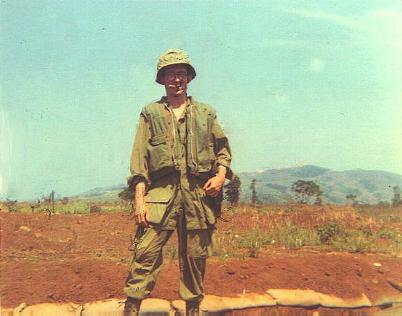
Bob Adams in Khe Sahn. April, 1968.
During Operation Scotland II. May, 1968.
June 1968.
Khe Sahn, May, 1968. From left to right: LCpl Jim Tucker,
Pfc Charles Perry, LCpl Dick Slade, and Cpl Mick Zullo,
Bunkers at Khe Sahn (above and below).
Bob Adams was a Navy Hospital Corpsman serving
with the 2nd Battalion First Marines in Vietnam from
Feb 1968 to Feb 1969. Bob now works as a
Licensed Clinical Social Worker in the Chicago area
in private practice. He is a member of the 2nd
Battalion First Marine Association, a fellowship
dedicated to continuing friendships formed in combat
and caring for those still struggling with the
aftereffects of Vietnam. He is the author of Place of
Angels, a stage play recounting his tour of duty,
which premiered at A Red Orchid Theatre in Chicago
in 2000. He is married and the stepfather of three.
|


